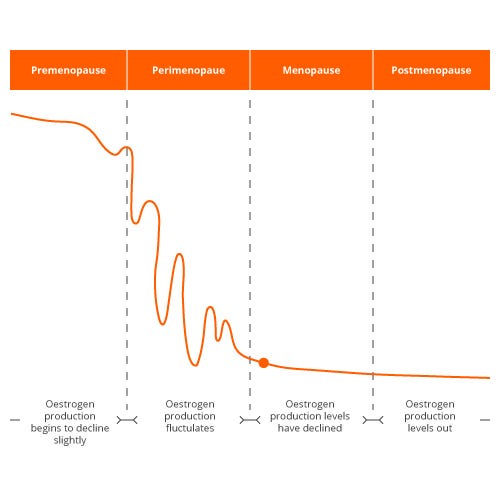Empty cart?
We can only assume that's because you haven't seen our latest offers
Sensilab uses cookies for their websites, which does not store personal data. Some cookies might already be installed. By proceeding to use this website you consent to the cookie usage.
Contact us online
100% satisfaction guarantee
Free delivery above €50
Contact us
info@sensilab.ieEntering perimenopause can feel like sailing into uncharted waters. This phase, aptly named for its position “around the time of menopause,” marks a period of significant hormonal fluctuation and change. As you navigate this sea of transformation, understanding the signs, symptoms, and coping strategies becomes crucial for a smooth sail.

Perimenopause, the precursor to menopause, is a natural phase marked by hormonal changes and a variety of symptoms. This stage typically begins around age 46 and can last up to 10 years.
During perimenopause, women may experience a range of symptoms like hot flashes, tiredness, brain fog, mood swings, headaches, emotional fragility, forgetfulness, night sweats, joint pain, weight gain, and vaginal dryness.
Periods may become more erratic, either heavier, lighter, or more irregular. This phase is typically divided into three stages:
Early perimenopause: regular periods with some perimenopausal symptoms.
Mid perimenopause: increasingly irregular periods without skipping, i.e. more than seven days (give or take) difference from the beginning of your current cycle to the next.
Late perimenopause: missing periods with gaps longer than 60 days.
During perimenopause, the regular swings of oestrogen and progesterone that define a typical 28-day cycle become irregular, leading to random shedding of the uterine lining without a discernible pattern.
The diagram below illustrates how oestrogen fluctuates during perimenopause:

It’s crucial to remember that pregnancy is still a possibility during perimenopause. Despite hormonal fluctuations and irregular periods, women can conceive and carry a child, potentially up to age 55. Therefore, effective contraception remains vital throughout perimenopause and into menopause to avoid unintended pregnancies.
Identifying the onset of perimenopause can be challenging because it varies significantly among women. Its symptoms often mimic responses to other life stressors. Many women don’t recognise the signs as related to hormonal changes, often attributing them to ageing, stress, or other life factors.
The difference between perimenopause and menopause is marked by a timeline. Menopause is the absence of periods for 12 consecutive months, marking the end of menstrual cycles. Perimenopause, on the other hand, is the transitional phase leading up to menopause, characterised by symptoms like low energy, stress, mood changes, and sleep disturbances.

These symptoms occur due to fluctuating levels of oestrogen, progesterone, and testosterone. Mood and psychological symptoms are common in early perimenopause, while physical symptoms like hot flashes often appear later. Perimenopause affects each woman uniquely, making personal experiences vary widely.
The consensus among menopause experts is that women can mitigate perimenopausal and menopausal symptoms by prioritising self-care. This involves:
Educating yourself: understanding perimenopause helps in recognising symptoms and managing expectations. Reading up on the latest research and information can provide clarity and reassurance.
Support systems: Utilising support groups and connecting with others going through similar experiences can be beneficial.
Regular exercise: engage in physical activities to maintain weight and reduce symptoms like hot flushes.
Relaxation techniques: practise yoga, meditation, and mindfulness to manage stress and improve mood.
Diet and lifestyle: opt for a balanced diet rich in vitamins, lean proteins, and fibres. Limit processed foods, alcohol, and caffeine.
Symptom tracking: log your symptoms and menstrual changes using period tracking apps for better understanding and management.
Talking therapies: consider cognitive behavioural therapy (CBT) for managing anxiety, mood swings, and sleep issues and to mitigate the impact of hot flashes and night sweats.
Supplements: use supplements with phytoestrogens like red clover and vitamins like B6 for hormone regulation, energy, and normal psychological function. M-Pause, an all-natural and hormone-free supplement containing Red Clover, is specifically designed to reduce menopausal and perimenopausal symptoms, offering a natural approach to managing these changes.
When perimenopause symptoms significantly impact your quality of life, it’s advisable to consult a GP or a menopause specialist. These professionals can assess your symptoms, age, and menstrual changes to confirm if you are in perimenopause.

Depending on your individual needs and medical history, they may recommend hormone replacement therapy (HRT) or other treatment options. Seeking professional advice can be crucial in managing symptoms effectively and improving your overall well-being during this transition.
Products for you
You may be interested
Leaving already?
You’ve left [X] items in your cart.
We can’t guarantee the products will still be available when you return.
Check out now and get an EXTRA 10% OFF.
